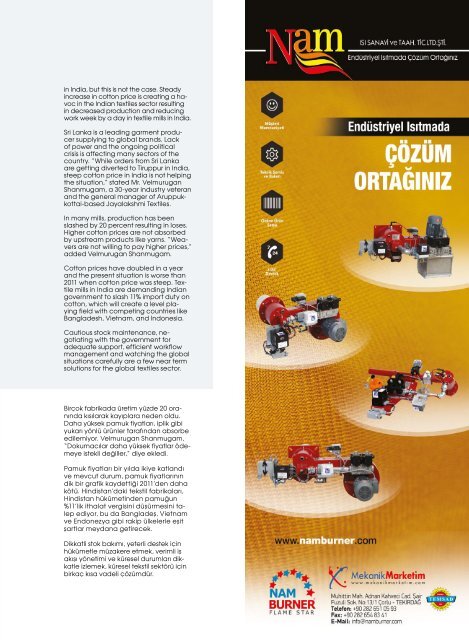Tekstil & Teknik September 2022
- No tags were found...
Create successful ePaper yourself
Turn your PDF publications into a flip-book with our unique Google optimized e-Paper software.
in India, but this is not the case. Steady<br />
increase in cotton price is creating a havoc<br />
in the Indian textiles sector resulting<br />
in decreased production and reducing<br />
work week by a day in textile mills in India.<br />
Sri Lanka is a leading garment producer<br />
supplying to global brands. Lack<br />
of power and the ongoing political<br />
crisis is affecting many sectors of the<br />
country. “While orders from Sri Lanka<br />
are getting diverted to Tiruppur in India,<br />
steep cotton price in India is not helping<br />
the situation,” stated Mr. Velmurugan<br />
Shanmugam, a 30-year industry veteran<br />
and the general manager of Aruppukkottai-based<br />
Jayalakshmi Textiles.<br />
In many mills, production has been<br />
slashed by 20 percent resulting in loses.<br />
Higher cotton prices are not absorbed<br />
by upstream products like yarns. “Weavers<br />
are not willing to pay higher prices,”<br />
added Velmurugan Shanmugam.<br />
Cotton prices have doubled in a year<br />
and the present situation is worse than<br />
2011 when cotton price was steep. Textile<br />
mills in India are demanding Indian<br />
government to slash 11% import duty on<br />
cotton, which will create a level playing<br />
field with competing countries like<br />
Bangladesh, Vietnam, and Indonesia.<br />
Cautious stock maintenance, negotiating<br />
with the government for<br />
adequate support, efficient workflow<br />
management and watching the global<br />
situations carefully are a few near term<br />
solutions for the global textiles sector.<br />
Birçok fabrikada üretim yüzde 20 oranında<br />
kısılarak kayıplara neden oldu.<br />
Daha yüksek pamuk fiyatları, iplik gibi<br />
yukarı yönlü ürünler tarafından absorbe<br />
edilemiyor. Velmurugan Shanmugam,<br />
“Dokumacılar daha yüksek fiyatlar ödemeye<br />
istekli değiller,” diye ekledi.<br />
Pamuk fiyatları bir yılda ikiye katlandı<br />
ve mevcut durum, pamuk fiyatlarının<br />
dik bir grafik kaydettiği 2011’den daha<br />
kötü. Hindistan’daki tekstil fabrikaları,<br />
Hindistan hükümetinden pamuğun<br />
%11’lik ithalat vergisini düşürmesini talep<br />
ediyor, bu da Bangladeş, Vietnam<br />
ve Endonezya gibi rakip ülkelerle eşit<br />
şartlar meydana getirecek.<br />
Dikkatli stok bakımı, yeterli destek için<br />
hükümetle müzakere etmek, verimli iş<br />
akışı yönetimi ve küresel durumları dikkatle<br />
izlemek, küresel tekstil sektörü için<br />
birkaç kısa vadeli çözümdür.

















